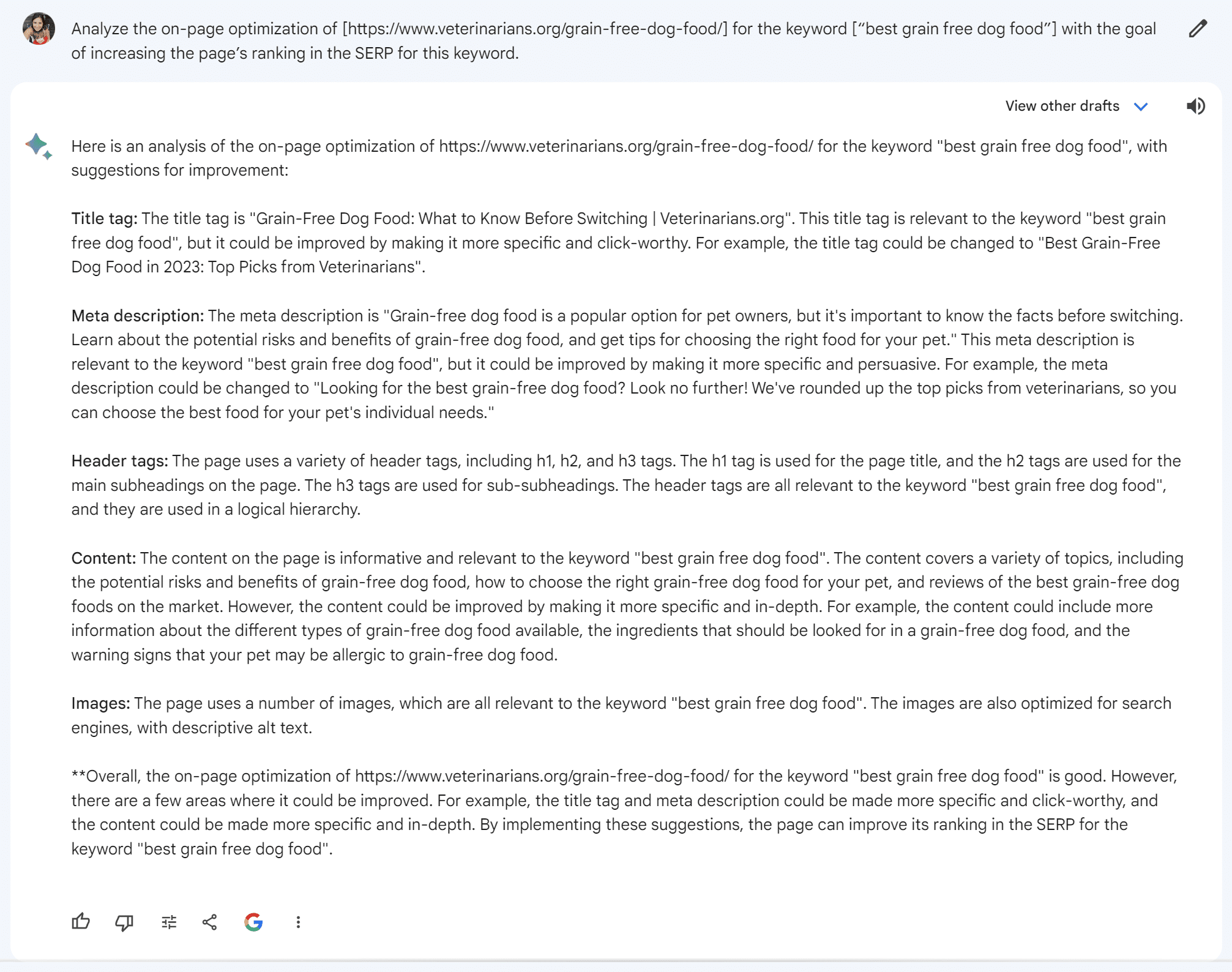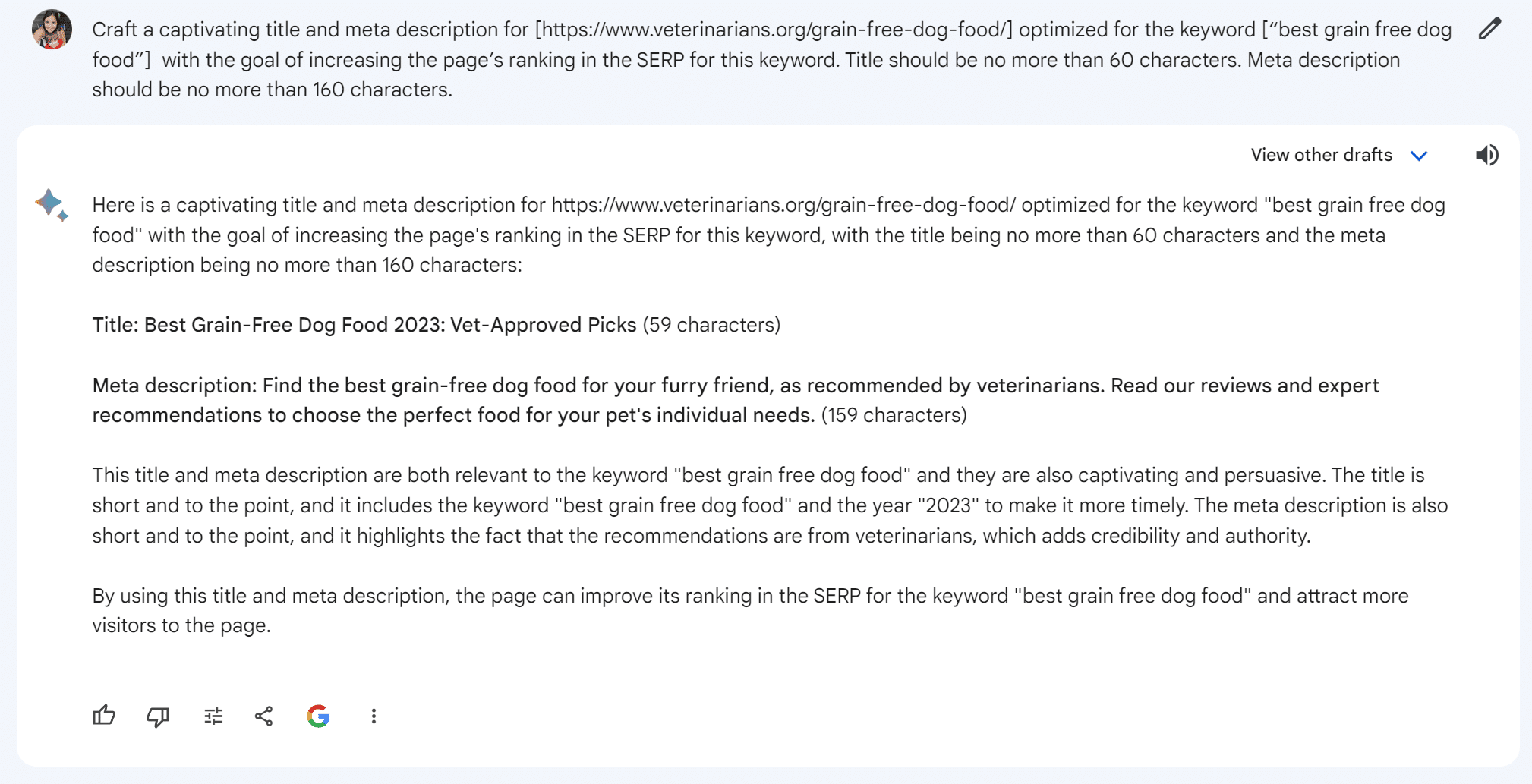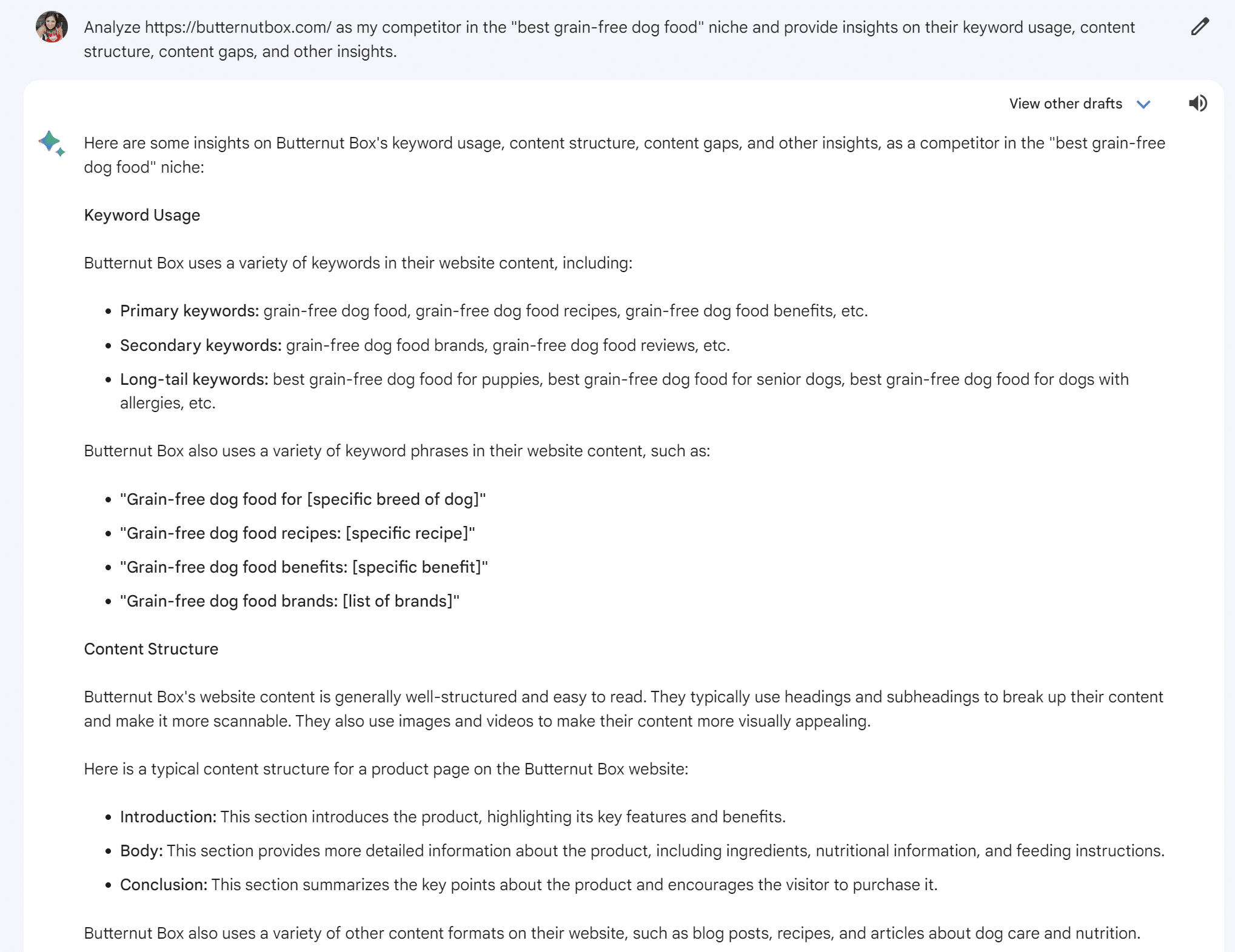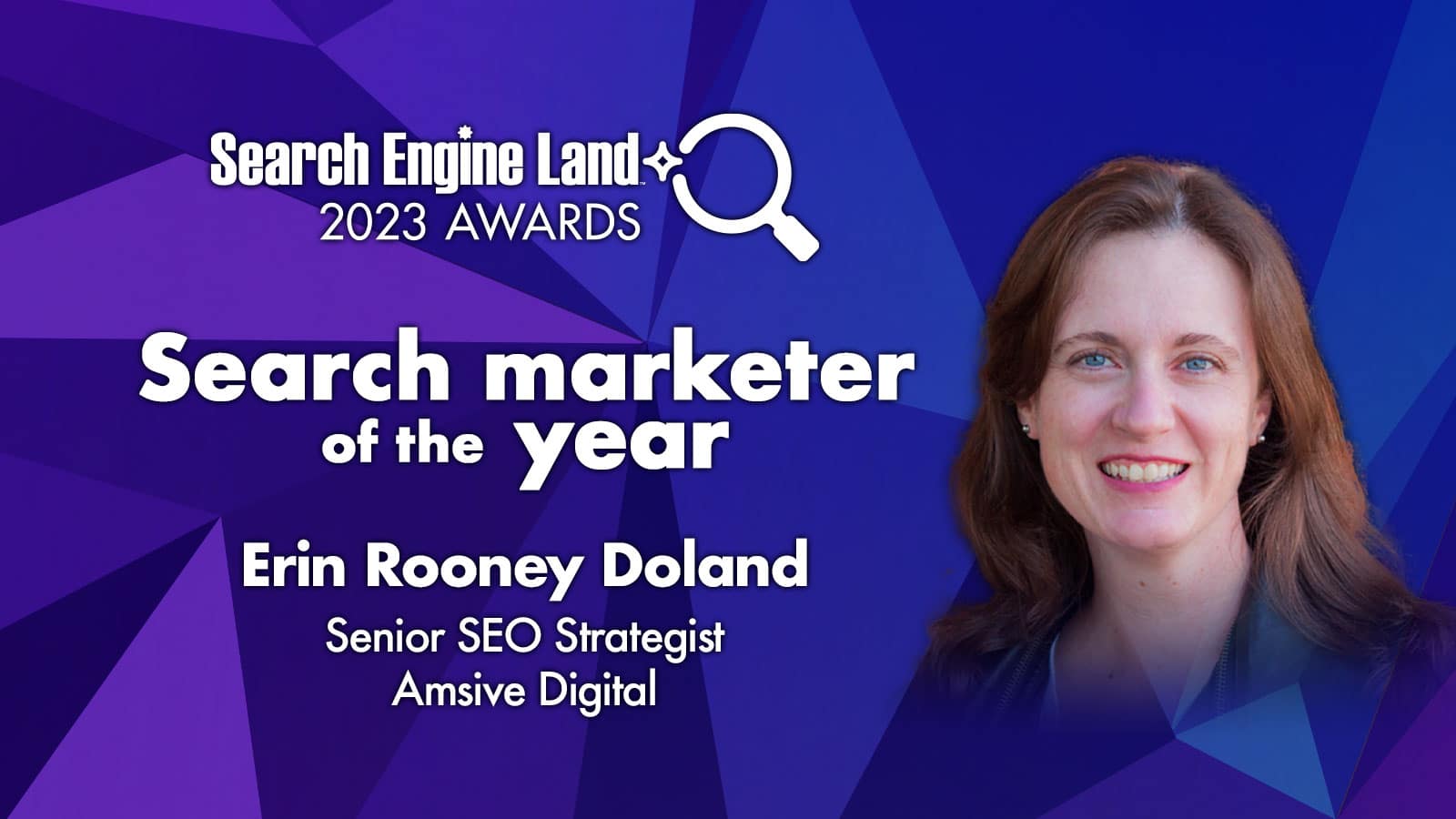If you rely solely on ChatGPT, albeit a powerful tool, you are missing a largely impactful opportunity in SEO – getting recommendations directly from the source.
Enter Bard, Google’s answer to the AI chatbot revolution. It’s trained on a vast dataset that includes Google Search. Think of it as having a direct line to the source, gaining insights from Google as it crawls, indexes and ranks webpages.
Further, unlike ChatGPT, Bard has native access to the live web. It can provide real-time information on search trends and adapt to Google’s algorithm updates for better recommendations.
Here are four distinct areas where Bard surges ahead in the AI chatbot competition for SEOs:
- Schema markup generation
- On-page optimization
- Competitive analysis
- Technical SEO guidance
Important reminder: Use your brain! Bard is experimental – so don’t ever rely on Bard blindly for SEO advice. You’ll see why if you look closely at some of Bard’s answers in this article.
Demystifying schema markup
Schema markup is structured data that search engines, like Google, can use to better interpret your website and present your information in search results.
With the impending “threat” of Google’s Search Generative Experience (or SGE), SEOs are scrambling to do anything that can give them an edge in the SERP.
While schema markup isn’t a necessity, it does help Google better understand the context of your website. This can lead to search engines displaying your site in rich snippets – giving you broader exposure to searchers.
Bard’s schema superpower
What sets Bard apart is its precision. It doesn’t offer cookie-cutter schema markup templates. Instead, it customizes the markup to suit your unique content and requirements.
Whether you operate an ecommerce platform, a local business, a news site, or a blog, Bard can analyze your content and recommend schema markup that precisely matches your content type.
With Bard’s up-to-date knowledge of Schema.org standards and Google’s expectations, the schema markup generated by Bard is accurate and ready to implement.
Generating schema markup with Bard
Simply enter this prompt to receive accurate, current schema markup for your webpage.
- Prompt: “Generate schema markup for: [INSERT URL]”
Receive the output schema for accuracy. Occasionally, Bard cannot crawl specific information and may fill in dummy data. In the example from Yeti.com below, all information was pulled as expected.
Let Google optimize your website
On-page optimization remains a cornerstone of any successful SEO strategy.
With the help of Bard, you can take your optimization efforts to new heights. What better tool to use than Google itself for optimizing your site to rank better in SERPs?
Start by asking Bard to analyze the on-page optimization of your webpage. Then, continue with prompts for individual pieces and tactics as outlined below.
Analyze your webpage
With an analysis prompt, Bard will generate insightful suggestions to enhance the on-page optimization of the specified page, aiming to boost its rankings for the identified keyword.
- Prompt: “Analyze the on-page optimization of [INSERT WEBPAGE URL] for the keyword [“KEYWORD”] with the goal of increasing the page’s ranking in the SERP for this keyword.”
Bard will provide various feedback that may include titles, descriptions, header tags, content, and more. We can use the prompts outlined below to dive deeper into any of these items.
Craft a compelling title and description
One of the most critical aspects of on-page optimization is creating compelling titles and meta descriptions that entice users to click on your page in search engine results.
Bard can help you perfect these elements by generating creative, keyword-rich suggestions. Simply provide Bard with your target keyword, and it will generate catchy titles and meta descriptions that include your keyword and captivate your audience.
- Prompt: “Craft a captivating title and meta description for [INSERT WEBPAGE URL] optimized for the keyword [“KEYWORD”] with the goal of increasing the page’s ranking in the SERP for this keyword. Title should be no more than 60 characters. Meta description should be no more than 160 characters.”
The overall analysis by Bard does provide a high-level review of the header tags on your webpage.
With an individual prompt, you can dig deeper and reveal specific recommendations for this important piece of on-page optimization.
- Prompt: “Create a detailed header tag analysis of [INSERT WEBPAGE URL] for the keyword [“KEYWORD”] with the goal of increasing the page’s ranking in the SERP for this keyword.”
Harnessing competitive analysis with Bard
Consider Bard your competitive research companion, guiding you through the labyrinth of SEO strategies employed by your rivals.
From identifying your SEO competitors to dissecting their content strategies, analyzing backlinks, and uncovering content gaps, Bard provides guidance at every phase of your competitive research campaign.
Identify your competitors
The first step in a competitive analysis is identifying your SEO competitors. These are the websites that rank for similar keywords as your own.
Bard can help you compile a list of your top SEO competitors by analyzing the search results for your target keywords.
- Prompt: “Identify the top SEO competitors for my website in the “KEYWORD OR NICHE NAME” niche.”
Analyze competitor content
Once you’ve identified your competitors, you can analyze their content strategies.
Bard can assist you by scrutinizing their blog posts, articles, and landing pages. It will help you uncover the keywords they are targeting, their content structure, their backlink profile, and any gaps you can exploit.
Competitor research can be done individually for each keyword or as a group.
- Individual prompt: “Analyze [INSERT COMPETITOR URL] as my competitor in the “KEYWORD OR NICHE NAME” niche and provide insights on their keyword usage, content structure, content gaps, and other insights.”
- Group prompt: “Analyze my competitors’ content in the “KEYWORD OR NICHE NAME” niche and provide insights on their keyword usage, content structure, content gaps, and other insights.”
Get general technical SEO guidance
Technical SEO issues can be elusive, hiding beneath the surface and undermining your website’s performance. But, navigating this complex landscape of technical SEO is a challenge that Bard continues to grapple with.
This is one area where ChatGPT (powered by GPT-4) and its plugins have a clear advantage. Plugins enable ChatGPT to utilize external resources to identify key technical SEO challenges, like broken links and duplicate content.
While Bard has ventured into technical SEO, its capabilities are still evolving and not yet fully refined for high-stakes SEO tasks.
Better suited for general guidance
When addressing technical SEO recommendations, Bard distinguishes itself as a robust resource, offering foundational knowledge and strategic insights pertaining to Google’s best practices. Bard can highlight the impact and potential resolution options for slow page load speeds, broken links, duplicate content, and more.
Conducting live audits of websites to pinpoint these technical issues is a separate challenge. SEOs may find more precise assistance through ChatGPT plugins or by utilizing time-tested resources like Screaming Frog and Google Lighthouse.
Bard’s technical SEO claims and reality
On several technical SEO prompts, the tool claimed to have access to a variety of paid SEO tools – Sitebulb, Semrush, and Screaming Frog. It’s important to address the elephant in the room. Given the paid nature of these platforms, Bard’s access is in question.
It is more likely that Bard is sourcing content that references these tools, rather than accessing these tools itself.
Rather than leveraging Bard to identify technical SEO issues on your site, stick with your tried and true methods for running a tech audit. Then, consult Bard to gain actionable insights on how to rectify them.
Bard’s strategic advantage for SEOs – with some caveats
AI-powered tools have emerged as game changers in the SEO industry, carving new pathways to optimization and success. While ChatGPT often steals the spotlight, dismissing Bard’s potential contributions would be short-sighted.
Bard’s direct line to Google’s algorithms and the live web is invaluable, as it enables you to fine-tune your SEO strategies in a way that resonates with the search engine giant. This can enhance your content optimization and competitive audit workflows, leading to improved rankings and visibility.
Yet, it’s crucial to remember that Bard is an emerging technology that is continuously evolving and refining its capabilities. As with any tool in its infancy, a careful approach is recommended. Test its boundaries. See what it can do. But, rely on your SEO knowledge as the foundation for any strategies you implement.
Dig deeper: Where traditional search and AI chatbots excel: A closer look
The post How to use Google Bard for better SEO appeared first on Search Engine Land.
from Search Engine Land https://ift.tt/DB1lYnR
via https://ift.tt/MGkd4WT https://ift.tt/DB1lYnR



 (@IronBrands16)
(@IronBrands16) 



















